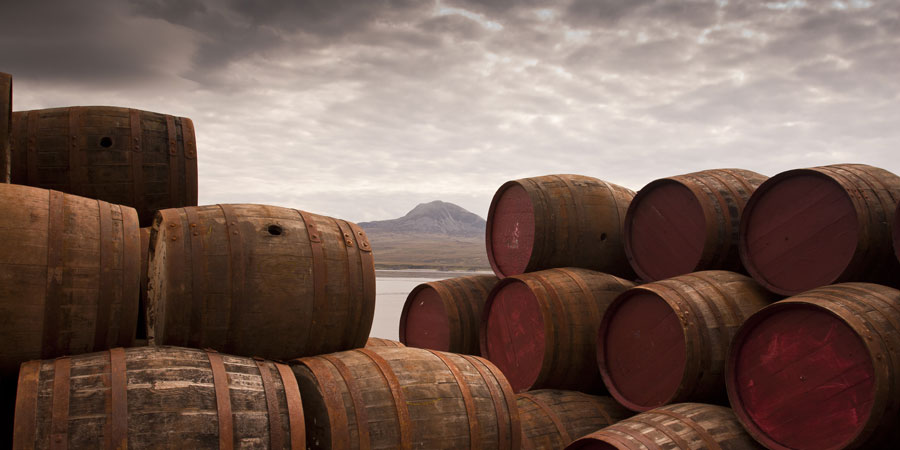Traditional Scottish music and poetry, an iconic haggis supper and a wee dram or two of whisky - Burns Night is undoubtedly a highlight in a month which otherwise offers little in the way of respite.
Burns Night is a nationwide celebration of the life of the Scottish bard, Robert Burns, held annually each year on his birthday, January 25th. Also known by his nickname 'Rabbie Burns', the poet penned over 550 songs and poems before he died in 1796 at just 37, of rheumatic fever. A political revolutionist and speaker, Burns was known for his social commentaries and as a source of inspiration for the founders of liberalism and socialism. His works were informed by the political climate of the time - indeed, one of his most noted poems 'Is There for Honest Poverty' (also known as 'A Man's A Man For A' That') promotes the notion that an individual's self-worth should not be defined by their social class or wealth, an idea firmly rooted in liberalism.
In modern times, though, Burns' name is perhaps more synonymous with traditional Scottish food, drink and merriment. While the yearly celebrations have adapted over the years, the sentiment of Burns Night remains unchanged: to pay homage to a celebrated national poet and Scotsman, by coming together and drinking whisky in the name of the arts.
Read on to discover how you should be celebrating this Burns Night…
Burns Supper
The main event of Burns Night, the spectacular 'Burns Supper' is an evening event filled with speeches, bagpipes, hearty cuisine and, ideally, an abundance of Scotch whisky. Burns was a passionate advocate for Scottish culture and individuality, so it is only fitting that his memory is honoured with a celebration of all things typically Scottish. Unsurprisingly, the crowning glory of any traditional Burns Supper is usually haggis, Scotland's most famous delicacy.
Haggis
For the uninitiated, haggis can be a daunting prospect, carrying an almost mythical status worldwide. Haggis is a savoury dish consisting of finely ground sheep pluck (heart, liver and lungs) combined with oatmeal, onions and various herbs and spices, traditionally served in the animal's stomach. The resulting flavour is delicious - rich and peppery, it is somewhat similar to a spiced minced beef, only more nuanced and complex. Although the best haggis will come homemade from your local butcher, the traditional dish can be easily purchased from a wide variety of supermarkets around the UK, with some even offering offal-free, vegetarian alternatives. Usually, the haggis is served in the traditional manner, accompanied by neeps and tatties (mashed swede and potato, respectively), and often a creamy whisky sauce.
Burns himself was so fond of haggis that he penned a poem, 'Address to a Haggis', immortalising his appreciation of the delicacy and eternally linking the pair. Tradition now dictates that after the haggis is brought in (accompanied by the cheery sound of bagpipes, of course), guests must stand, while the loving ode to Scotland's national dish is recited by the host:
"Auld Scotland wants nae skinking ware
That jaups in luggies:
But, if ye wish her gratefu prayer,
Gie her a Haggis."
Speeches and toasts
The good-natured dramatics of Burns Night play a big part in making the festivities such a joy. Speeches are an important part of the evening, each nodding to the persevering relevance of Burns' philosophies in the modern day, as well as adding a rich theatre to the already cheery atmosphere. 'The Selkirk Grace', a short thanksgiving prayer written using the recognisable Scots dialect and designed to usher in the evening's meal, is the first recital. Following this, and after the haggis has been appropriately addressed, guests are encouraged to raise a glass and toast 'to the haggis!' before indulging in the magnificent spread.
After supper, guests are invited to celebrate the spirit of Robert Burns, with a singer or musician regaling the crowd with his most beloved songs, and perhaps a moving recital of one of his enthralling poems. 'The Immortal Memory' is a captivating spoken account of the life of Burns, exploring themes of politics, literature and the arts in what is a fitting personal tribute to Scotland's favourite bard - followed, of course, by a heartfelt toast.
The 'Toast to the Lassies' originated as a thank you speech to the women who prepared and cooked the evening's meal, but is now an affectionate and witty speech which celebrates the role of women in modern society, with the response, 'Reply to the Laddies', being similarly light-hearted. As the festivities draw to a close, the host will call upon a guest to give the 'Vote of Thanks', before the party join hands for a cheerful rendition of 'Auld Lang Syne', Burns' most recognised song and the perfect way to round off the celebrations.
Whisky
The fitting tipple of choice for Burns Night merriment, whisky was commemorated in both song and poem by Burns, who dubbed it Scotland's 'native drink.' On an evening when it's almost mandatory to indulge in a dram or two, take the opportunity to crack open your finest single malt as a jovial nod to the national poet.
Remember that while formal Burns Night celebrations follow a standard order, those planning a more informal get-together may prefer to select several of their favourite traditions to incorporate into their festivities. No matter how you choose to celebrate this Burns Night, there is no doubt that the famed bard's work stands as a testament to Scotland's literary and artistic history, so be sure to raise a dram of whisky in his name.
"O Whisky! soul o' plays an' pranks! Accept a Bardie's gratefu' thanks!"






